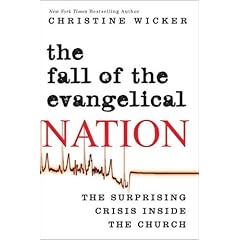
Walking through Border's the other day, I saw this book and immediately picked it up. Two things of note to me.
Christine Wicker used to work for the
Dallas Morning News that during the 90's had a great religion section on Saturdays. She was a key part of its success and depth.
I sat down yesterday and read through the whole book in about three hours. It is a quick read and I am not a fast reader. It is most antecdotal stories and stats that many in the church are very familiar with. She uses numbers that are not shock, she relies upon
George Barna.
The thrust of her argument is that the evangelical movement is really as large as it thinks it is. It represents not 1/4 of the country but a mere 7% to 8% of the United States. She also notes that Christianity is not growing in the United States. This complies with other arguments being made like
the strength of Christianity being found in the Southern Hemisphere and Asia. Philip Jenkins has promoted this idea in his book, the Next Christendom.
She not only argues that the Evangelical movement has been used and perhaps abused by the Republican Party and the conservative movement, but she also argues whether or not evangelical Christianity's main premise makes any sense at all. She echoes the sentiments of "The New Atheists."
Where she says that the evangelical church is failing is in two areas.
Those who are super committed to following Jesus Christ and his mission are becoming more and more disillusioned with the local church. They are doing faith outside a corrupted church.
From a mainline perspective, I see this. I have seen people come to the church to make a difference and when they can't they leave. The church's bueracracy and rules conflict with God is calling them to do. They move to more conservative churches or leave. For Barna, he says people just leave and start something new.
Second area, people are becoming disillusioned with the evangelical faith. All of the bad stuff about evangelicalism comes home to roost and they leave. That is seen in Catholics leaving the church over clergy sexual abuse. It is scene in mainline churches as well.
So, what does this leave us with? She makes clear some very salient points. Leaders within the evangelical movement bluster about morality, but a majority of Americans do not live a moral life. The Southern Baptist Convention may say boycott Disney, but the Southern Baptist Men will not boycott ESPN.
To be hopeful, because her argument is a strong against evangelicals, but mainline Christians are no better. We are at the end of an age and there is a new age coming. In the midst o fthese transitions, I hope and believe that spirituality comes ot the forefront and this provides avenues for Christians to witness the grace, love and peace of Jesus Christ.





